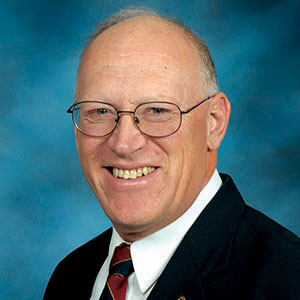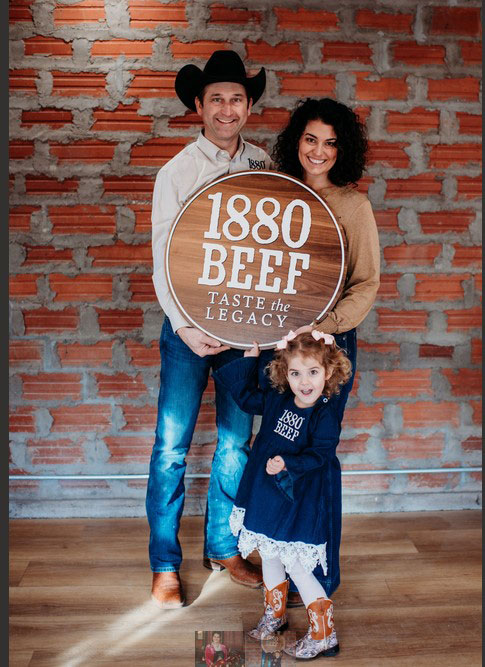Kansas Profile – Now That’s Rural: Sara and Andy Larson, 1880 Beef
At a glance: Andy Larson’s family has raised beef in the northern Flint Hills since 1880. Using his beef production skills and his wife Sara’s marketing skills, they have opened a direct beef marketing business that is sending beef products across the nation.
More information: Ron Wilson, rwilson@ksu.edu, 785-532-7690
Photos: Ron Wilson | Andy, Sarah and Clara Larson
Website: Huck Boyd National Institute for Rural Development
Nov. 6, 2024

By Ron Wilson, director of the Huck Boyd National Institute for Rural Development at Kansas State University
A package is arriving at Cape Cod in Massachusetts. What is the package?
In this case, it is a package of premium steaks from a ranch halfway across the continent in rural Kansas.
Last week we met floral designer Sara Larson. She is also manager of the family’s beef marketing business with her rancher husband, Andy Larson.
 Andy Larson has deep roots in agriculture and in north central Kansas. In 1865, his ancestor, Erick Larson, emigrated from Sweden. In 1872, Erick utilized the homestead act to stake a claim in Mitchell County, Kansas. Here he brought his new wife, Emma, from Sweden.
Andy Larson has deep roots in agriculture and in north central Kansas. In 1865, his ancestor, Erick Larson, emigrated from Sweden. In 1872, Erick utilized the homestead act to stake a claim in Mitchell County, Kansas. Here he brought his new wife, Emma, from Sweden.
At right: Andy, Sara and Clara Larson | Download this photo
After seeing the Kansas Flint Hills, the Larsons decided to move slightly east. In 1880, they purchased 310 acres of Flint Hills grass and creek bottom-land in northern Riley County. The farm is near the rural community of Green, population 95 people. Now, that’s rural.
The Larsons expanded their farm through the years. The farm headquarters includes a home finished in 1896 that was built by Erick Larson and son, John. Seven generations of Larsons have lived within its walls.
Andy Larson grew up here, studied agribusiness at K-State, earned an MBA from Emporia State, and met and married Sara before coming back to the ranch. They live in a remodeled 1911 home. Their daughter, Clara, is the eighth generation of Larsons to live in northern Riley County.
Ever since coming to this region in 1880, the Larsons have maintained a beef cow herd and raised crops. They have also worked hard at improving their beef quality through the years.
Their Black Angus beef was so popular that Andy would frequently get requests for a steer or for cuts of beef. “He’s been taking orders for beef for years,” Sara Larson said. They decided to formalize their direct beef marketing business, including extensive research on pricing and cuts of beef.
“Andy knows beef production and I know how to bring a product to market,” Larson said. Using their year of origin in Riley County, they named the business 1880 Beef. The company motto is ‘Taste the Legacy.’
“We’re lovers of history,” Larson said. She is active in the Daughters of the American Revolution, for example. In order to capture the rich history of the family cattle business, the name 1880 Beef seemed to fit.
Today, 1880 Beef offers various premium cuts of beef, many using the term 1880 Reserve. These include the tomahawk steak, KC strip, smokehouse brisket, cattle barron filet of beef, baseball steaks, bone-in ribeye, sirloin tips, fajita meat, roasts and open range beef bacon. Their signature ground beef is 90 percent lean.
Beef bundles include a mix of these cuts for the customer’s use. There are also options for corporate gifting of beef products and subscriptions where customers can sign up to receive a regular supply of 1880 Beef products.
Sometimes the Larsons are asked, ‘Where do you get your beef?’
The answer: They grow their own.
“Our cattle are fed from the corn we raise on our farm,” Larson said. The cattle don’t leave the ranch until they go to be processed. At that point the beef is aged for 21 days in a USDA-certified facility.
Beef products are shipped vacuum sealed and frozen over ice packs inside of an insulated pouch. The company uses UPS 1-2 day shipping to ensure timely arrival. The Larsons recently opened a retail outlet in Manhattan and have shipped beef from South Carolina to California.
“We assure quality every step of the way from conception to consumption,” Larson said.
Their website states: “We uphold stringent standards for the care and feeding of our animals. (The Larsons are) committed to delivering an exceptional eating experience.”
For more information, go to www.1880beef.com.
It’s time to leave Cape Cod, Massachusetts, where a package of steaks is being delivered from a ranch across the country in Kansas. We commend Sara and Andy Larson for making a difference with entrepreneurship in direct beef marketing.
They are working hard to enhance and share beef quality because they have a lot at stake.
Audio and text files of Kansas Profiles are available at www.huckboydinstitute.org/kansas-profiles. For more information about the Huck Boyd Institute, interested persons can visit www.huckboydinstitute.org.
***

K‑State Research and Extension is a short name for the Kansas State University Agricultural Experiment Station and Cooperative Extension Service, a program designed to generate and distribute useful knowledge for the well‑being of Kansans. Supported by county, state, federal and private funds, the program has county extension offices, experiment fields, area extension offices and regional research centers statewide. Its headquarters is on the K‑State campus in Manhattan. For more information, visit www.ksre.ksu.edu. K-State Research and Extension is an equal opportunity provider and employer.